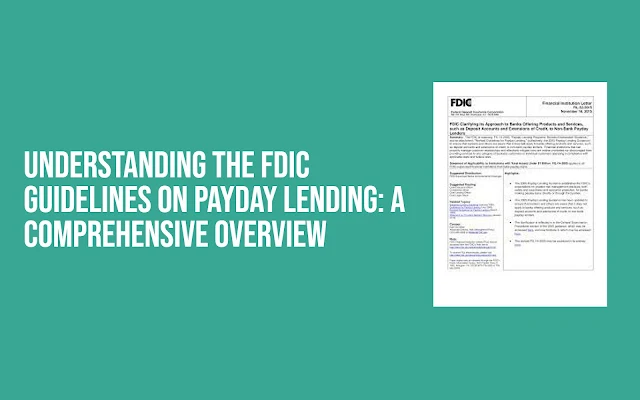Understanding the FDIC Guidelines on Payday Lending: A Comprehensive Overview
Payday loans have become an increasingly popular form of short-term borrowing in recent years. However, they are also one of the most controversial types of loans due to their high-interest rates and the potential for borrowers to become trapped in a cycle of debt. In response to concerns about payday lending practices, the Federal Deposit Insurance Corporation (FDIC) has issued guidelines aimed at promoting responsible lending and protecting consumers. In this article, we will provide a comprehensive overview of the FDIC guidelines on payday lending.

What are payday loans?
Before we dive into the FDIC guidelines on payday lending, it's important to understand what payday loans are. Payday loans are short-term loans that are typically due on the borrower's next payday. They are often marketed to people with poor credit who may not be able to qualify for traditional loans. Payday loans typically have high-interest rates and fees, making them an expensive form of borrowing.
FDIC guidelines on payday lending
The FDIC issued guidelines in 2015 aimed at promoting responsible payday lending practices and protecting consumers. The guidelines are not regulations, but they are intended to be a best-practices guide for banks that offer payday loans.
Scope of the guidelines
The guidelines apply to all banks that offer payday loans, including both direct deposit advance loans and loans made by third-party lenders. The guidelines also apply to banks that partner with third-party lenders to offer payday loans.
Underwriting standards
One of the key aspects of the FDIC guidelines is the underwriting standards that banks must follow when offering payday loans. Underwriting is the process of evaluating a borrower's ability to repay a loan. The guidelines require banks to:
- Evaluate a borrower's ability to repay the loan based on the borrower's income and expenses
- Limit the amount of the loan to an amount the borrower can afford to repay
- Limit the number of loans a borrower can take out in a year
Cost of the loan
The FDIC guidelines also address the cost of payday loans. Banks are required to disclose the cost of the loan to the borrower in a clear and concise manner. The cost must be disclosed as a dollar amount, not just as a percentage rate.
Collection practices
The FDIC guidelines also require banks to follow responsible collection practices. Banks must:
- Contact borrowers who are delinquent on their loans to try to work out a repayment plan
- Avoid taking automatic repayment from a borrower's account if it will cause the account to become overdrawn
- Not charge excessive fees for late payments
Conclusion
The FDIC guidelines on payday lending are designed to promote responsible lending practices and protect consumers from predatory lending practices. While the guidelines are not regulations, they are a best-practices guide for banks that offer payday loans. By following these guidelines, banks can help ensure that borrowers are able to repay their loans and avoid falling into a cycle of debt.
FAQs
-
What is the FDIC? The FDIC is the Federal Deposit Insurance Corporation. It is an independent agency of the federal government that provides insurance to depositors in banks and savings institutions.
-
Do the FDIC guidelines apply to all payday lenders? The guidelines apply to banks that offer payday loans, including both direct deposit advance loans and loans made by third-party lenders. They also apply to banks that partner with third-party lenders to offer payday loans.
-
Can payday lenders still charge high-interest rates? Yes, payday lenders can still charge high-interest rates, but the FDIC guidelines require banks to evaluate a borrower's ability to repay the loan and limit the amount of the loan to an amount the borrower can afford to repay.
-
What happens if a borrower can't repay a payday loan? If a borrower can't repay a payday loan, they may face late fees, additional interest charges, and even legal action. It's important for borrowers to carefully consider the cost of a payday loan and their ability to repay it before taking out a loan.
-
Are payday loans a good option for borrowing money? Payday loans can be an expensive form of borrowing and can trap borrowers in a cycle of debt. It's important for borrowers to carefully consider their options and explore alternatives, such as personal loans or credit cards with lower interest rates, before taking out a payday loan.

